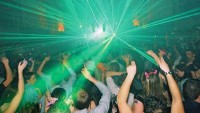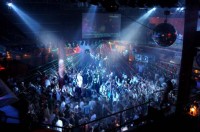DJ and turntablist GALACTUS JACK argues that the Church needs to embrace dance culture in its worship

In their superb book on the history of the DJ, Last Night A DJ Saved My Life, authors Bill Brewster and Frank Broughton trace the origins of the disc jockey back to ancient religious and pagan rituals of dance. History suggests that dance has been an important part of culture since the dawn of man. These rituals would be led by some kind of shaman, witchdoctor or priest who would dictate the ebb and flow of the ceremony and its expression.
No doubt about it, for many people the DJ has been the modern equivalent of such a role in recent history, with clubs their new church. But, where religion and superstition used to be the driving force behind such expression, it is now mainly about self-indulgence. The DJ creates an environment where we can enjoy ourselves, let loose and satisfy our own needs and desires.
Music has become a huge focus of corporate worship in the modern church. Indeed we now refer to the band taking to the stage as our "time of worship", an unhelpful habit that is leading an entire generation of Christians to believe that we can only worship God with a guitar and a sing-song on a Sunday morning. Not only that, it has also become very "me" focused. In fact, we could probably take the statement about self-indulgent clubbers from above and apply it to many Christian worshippers, replacing the DJ with "worship leader". Whilst that may sound somewhat judgmental, I would be the first to hold my hand up and admit I've been guilty of such an attitude towards my worship in the past.
Whilst it is definitely important for us to move away from the incorrect attitude of "worship is music", we certainly shouldn't throw the baby out with the bathwater. Music is an incredible tool for us to use as part of our worship, so let's get creative with it. Herein lies another problem. Not only are we so insistent on using music for every expression, we seem to only use one form.
Leaving aside the thwart topic of pagan religions and the spirits their rituals might possibly conjure up, I love the image of ancient worshippers gathering together around a fire and just dancing themselves to exhaustion in honour of their god, as a priest leads them with the beating of a drum and some spiritual words or chanting. There is something so simple and pure about the expression of dance in such a form as that.
So what is holding us back from branching out of our musical comfort zone and trying something different in our own congregations? Especially something that, for example, encourages dance more than singing, an idea firmly planted in the history of worship expression?
Well, first of all, something like dance music is a niche market (as is all music when you actually think about it), so there will always be people who simply do not like the style of the songs. Now, although that may be a barrier to us doing such an act regularly, if we are to engage with our entire congregation (although not necessarily all of the people all of the time!) and value every member of our community, surely we should give some air time to styles which impact different people in different ways?

I have heard it said in the past that the reason someone wouldn't want a DJ or dance music as part of their expression of worship is because of the association with the club scene, a scene that is perceived to be far from holy with its reputation of sex, drugs and hedonism (a reputation which, like many, is greatly exaggerated). Funny, then, that in recent years we have embraced a soft rock sound, using standard rock band set-ups that we insist "are as good as secular bands!" Funny, because the rock scene has a far longer and darker association with sex, drugs and general cheeky behaviour than the dance music scene!
You know, I think the reason that people can go a little pale in the face at the concept of something like DJ-led worship is because it demands a different response to our pre-packaged musical norm. In these more "civilised" times, it can be hard to inspire a congregation to cut loose a little and let their bodies do the talking. After all, no one wants to look like a fool, and I don't believe for a second that God wants you to look like one either. But God is looking for authentic expressions when we gather together that extend beyond the ease for some of us of half-heartedly singing songs with lyrics that are far from a reflection of where we are actually at in our walk with Christ. How many of us have lied to God whilst singing a worship song? Yep, that's me again ashamedly putting my hand up. Sometimes we sing things that are just not true to our walk, because it's part of our "time of worship".
It's a tragedy in some ways that we have lost the art of dance in worship. That simple, honest and primal expression united cultures and communities in their desire to please their god or gods. Often times these days it feels like our modern expressions can divide as much as they unite, and fall short at times in actually allowing us honest expression.
I would never want DJ worship, or dance, to become the "norm" as the Church's form of expression, any more than I want to see any "norm" emerge. I would love, however, to see us value each other in community enough to branch out into new and different expressions that some may find helpful and others (just as importantly) challenging. History shows us a rich and varied heritage of worship expressions (many which have nothing to with music at all) and the Bible does not give us a step-by-step worship expression guide to point us to one "correct" style. If Jesus had wrapped up the sermon on the mount with an epic DJ set we would all be worshipping along to DJs in our churches. He didn't do that, thankfully; instead he did something far more important through his death and resurrection - he enabled our worship, so that we may live it as a lifestyle, and when gathered together express it creatively and inclusively.
Brewster and Broughton go on in their book to explain the role and importance of the DJ to the "worshippers", "DJing is not just about choosing a few tunes. It is about generating shared moods; it's about understanding the feelings of a group of people and directing them to a better place. In the hands of a master, records create rituals of spiritual communion that can be the most powerful events in people's lives."
Now, if we apply that to the concept of worship expression, an expression where God is the focus, not the DJ or the worshipper, we have an amazing image of what a shared worship expression can be, regardless of style. That sounds like the kind of worship environment I'd like to share in. That sounds like the kind of worship expression I'd like to live out.
Last night a DJ saved my life? No, God did that a long time ago. Now,
it's time to dance. ![]()


 Ben Jack is the director of Generation Now, a youth ministry devoted to exploring questions of faith and life. As a speaker and author of
Ben Jack is the director of Generation Now, a youth ministry devoted to exploring questions of faith and life. As a speaker and author of 





Well said!
We're stuck in a rut musically, and it needs to be sorted. Bring on the dance music, bring on the jazz, bring on the choral, bring on the rock!
Something different might just wake us all up and get us truly worshipping rather doing holy kareoke.